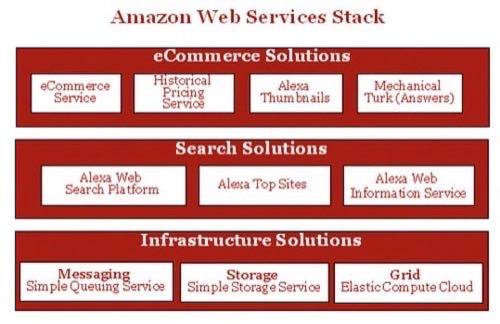Alex Iskold is reporting live from ETech 2007
Werner Vogels, VP and CTO of Amazon.com, took
the ETech stage to discuss the challenges in building a large-scale, reliable web infrastructure.
Amazon spent a decade and a whopping $2 billion dollars to build the world class technology that powers their web sites.
Today Amazon makes available their own infrastructure to the anyone, via Amazon Web
Services. We have extensively analyzed
Amazon Web Services, as well as companies that are already
leveraging
it in their businesses.

AWS value proposition
Why build on Amazon Web Services? Vogels said because there are compelling business and technical advantages:
- Total Cost: Running services via Amazon is substantially lower than building infrastructure and running it on your own;
- Pay as you go: Pay only for what you consume;
- Time to market: AWS lets businesses focus on their core competency instead of
infrastructure; - Scalability: Automatic scalability is guaranteed by adding more hardware;
- Robustness: Amazon guarantees 99.9999% of up time;
- Security: Using Amazon Services collectively makes your offering more secure;
- Technical complexity: Building things from scratch requires a lot of knowledge and experience.
A recap of what Amazon offers today
Amazon is rapidly moving to build a new kind of infrastructure, one
that can really be considered a new WebOS. The stack of services
offered by Amazon today is quite impressive. Here is how we summarized it in
graph form in
November:

As we discussed in November, Amazon is likely
to roll out more services in the near future. Here are some further pointers that can be helpful if you are new to AWS:
- AWS home page
- AWS blog by AWS Chief Evangelist Jeff Barr
- Business Week coverage of AWS
- Jeff Bezos Podcast at Web 2.0
Werner Vogels: focus on your idea!
Dr. Vogels made the case for why it makes
sense for businesses, particularly startups, to use AWS. He started by pointing out
that building Web-scale services is incredibly difficult. He showed examples of traffic graphs
from major retailers like Target and Walmart that demonstrated that even these companies are not
able to handle peak loads. He added that conventional wisdom is just wrong when it comes to understanding
what it takes to build a scalable infrastructure.
For startups, Vogels advocated the 37Signals philosophy – build now, scale later. This is not because
scaling isn’t important, it is because scaling is just too hard. As a young company, focusing
on infrastructure is very costly. His statistics indicated that up to 70% of resources
can go into what he calls Undifferentiated heavy lifting – work that does not fit
into your company’s core competency. Instead, he suggests that businesses should rely on AWS to do
all this work.
Conclusion
AWS is continuing to impress. Amazon is now focused on amplifying the customer success stories
and turning that buzz into more customers. Given the pricing and simplicity of AWS, it appears that
it is not going to be long before a large percentage of small and medium size companies will be
using one or more Amazon Services. Larger companies are likely to lag behind, mostly for political
and branding reasons, so it will be interesting to see if this inflexibility will hurt them in the long run.

















